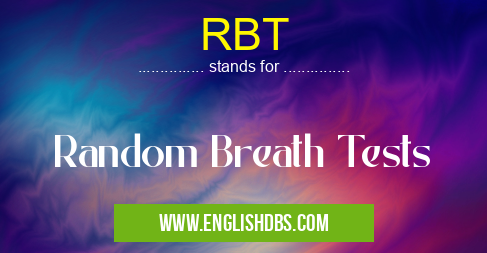What does RBT mean in UNCLASSIFIED
Random Breath Tests (RBTs) are a common enforcement tool used to deter and detect impaired driving. RBTs involve the random stopping of vehicles and the testing of drivers for the presence of alcohol or drugs. They are an important part of road safety strategies and can significantly reduce the risk of accidents caused by impaired driving.

RBT meaning in Unclassified in Miscellaneous
RBT mostly used in an acronym Unclassified in Category Miscellaneous that means Random Breath Tests
Shorthand: RBT,
Full Form: Random Breath Tests
For more information of "Random Breath Tests", see the section below.
Meaning and Purpose
RBTs are designed to improve road safety by:
- Deterring drivers from consuming alcohol or drugs before driving
- Identifying and removing impaired drivers from the road
- Providing evidence for enforcement actions against impaired drivers
Implementation
RBTs are typically conducted by law enforcement officers who are trained to administer breathalyzer tests. Drivers are randomly selected for testing, and they are required to provide a breath sample. The breath sample is then analyzed to determine the driver's blood alcohol concentration (BAC).
Effectiveness
RBTs have been shown to be effective in reducing impaired driving and improving road safety. Studies have found that RBTs can reduce the number of alcohol-related traffic accidents by up to 20%.
Essential Questions and Answers on Random Breath Tests in "MISCELLANEOUS»UNFILED"
What are Random Breath Tests (RBTs)?
RBTs are conducted by law enforcement officers to detect alcohol consumption in drivers. They involve using a breathalyzer device to measure the concentration of alcohol in a person's breath.
Why are RBTs conducted?
RBTs are primarily conducted to deter and detect drunk driving. They aim to improve road safety by reducing the number of alcohol-related crashes and fatalities.
How often are RBTs conducted?
The frequency of RBTs varies depending on the jurisdiction and time of day. In general, they are more common during peak traffic hours and during holiday periods or special events.
Can I refuse to take an RBT?
In most jurisdictions, it is illegal to refuse to provide a breath sample if requested by a police officer. Refusal may result in legal consequences, such as a fine, driver's license suspension, or imprisonment.
What happens if I fail an RBT?
The consequences of failing an RBT depend on the jurisdiction and the level of alcohol detected in your breath. In general, penalties can range from fines to license suspension or revocation, and in some cases, imprisonment.
Can I challenge the results of an RBT?
Yes, it is possible to challenge the results of an RBT. You may have the option to request a blood test, which can be more accurate than a breath test. You should also contact a lawyer to discuss your legal options.
Final Words: RBTs are an important tool for improving road safety and reducing the risk of accidents caused by impaired driving. By deterring drivers from consuming alcohol or drugs before driving, identifying and removing impaired drivers from the road, and providing evidence for enforcement actions, RBTs contribute to safer roads for everyone.
